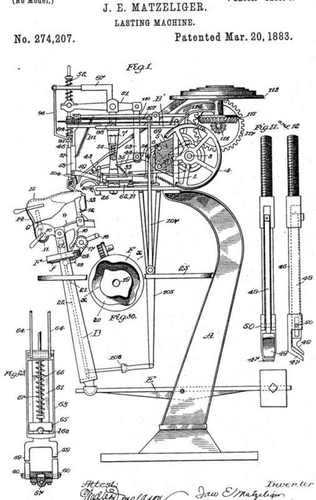Jan Matzeliger on:
[Wikipedia]
[Google]
[Amazon]
Jan Ernst Matzeliger (September 15, 1852 – August 24, 1889) was an inventor whose
 Matzeliger was born in Dutch Guiana, now
Matzeliger was born in Dutch Guiana, now
Engineering and Technology: Jan Matzeliger
Encyclopædia Britannica's Guide to Black History
{{DEFAULTSORT:Matzeliger, Jan Ernst 1852 births 1889 deaths African-American inventors 19th-century American inventors Surinamese emigrants to the United States Surinamese people of Dutch descent 19th-century deaths from tuberculosis Tuberculosis deaths in Massachusetts People from Paramaribo
lasting
''Lasting'' (original title: Nieulotne) is a 2013 Polish drama film directed and written by Jacek Borcuch.
Plot
''Lasting'' is an emotional love story about Michał and Karina, a pair of Polish students who meet and fall in love while working s ...
machine brought significant change to the manufacturing of shoes.
Biography
 Matzeliger was born in Dutch Guiana, now
Matzeliger was born in Dutch Guiana, now Suriname
Suriname (; srn, Sranankondre or ), officially the Republic of Suriname ( nl, Republiek Suriname , srn, Ripolik fu Sranan), is a country on the northeastern Atlantic coast of South America. It is bordered by the Atlantic Ocean to the nor ...
. His father, Ernst Matzeliger, was a third generation Dutchman of German descent living in the Dutch Guiana capital city of Paramaribo. He owned and operated the Colonial Shipworks that had been in his family for three generations. His mother was a house slave of African descent; she lived on the plantation of which his father was the owner for a time. At the age of ten, Jan Matzeliger was apprenticed in the Colonial Ship Works in Paramaribo, where he demonstrated a natural aptitude for machinery and mechanics. He left Dutch Guiana at age 19, and worked as a mechanic on a Dutch East Indies merchant ship for several years before settling in Philadelphia, Pennsylvania
Philadelphia, often called Philly, is the largest city in the Commonwealth of Pennsylvania, the sixth-largest city in the U.S., the second-largest city in both the Northeast megalopolis and Mid-Atlantic regions after New York City. Since ...
, where he first learned the shoe trade. By 1877, he spoke adequate English (Dutch was his native tongue) and moved to Massachusetts to pursue his interest in the shoe industry. He eventually went to work in the Harney Brothers Shoe factory.
In the early days of shoemaking, shoes were made mainly by hand. For proper fit, the customer's feet had to be duplicated in size and form by creating a stone or wooden mold called a "last" from which the shoes were sized and shaped. Since the greatest difficulty in shoemaking was the actual assembly of the soles to the upper shoe, it required great skill to tack and sew the two components together. It was thought that such intricate work could only be done by skilled human hands. As a result, this phase was not yet mechanized and shoe lasters held great power over the shoe industry. They would hold work stoppages without regard for their fellow workers' desires, resulting in long periods of unemployment for them.
After five years of work, Matzeliger obtained a patent for his invention of an automated shoe laster in 1883. A skilled hand laster could produce 50 pairs in a ten-hour day. Matzeliger's machine could produce between 150 and 700 pairs of shoes a day, cutting shoe prices across the nation in half.
Death and legacy
Matzeliger sacrificed his health working exhausting hours on his invention and not eating over long periods of time. He caught a cold which quickly developed intotuberculosis
Tuberculosis (TB) is an infectious disease usually caused by '' Mycobacterium tuberculosis'' (MTB) bacteria. Tuberculosis generally affects the lungs, but it can also affect other parts of the body. Most infections show no symptoms, ...
. His early death in Lynn, Massachusetts
Lynn is the eighth-largest municipality in Massachusetts and the largest city in Essex County. Situated on the Atlantic Ocean, north of the Boston city line at Suffolk Downs, Lynn is part of Greater Boston's urban inner core. Settled by E ...
from this disease meant he never saw the full profit of his invention. He died on August 24, 1889, three weeks shy of his 37th birthday.
Matzeliger's invention was perhaps "the most important invention for New England." His invention was "the greatest forward step in the shoe industry," according to the church bulletin
A parish magazine is a periodical produced by and for an ecclesiastical parish, generally within the Anglican Church. It usually comprises a mixture of religious articles, community contributions, and parish notices, including the previous month‚ ...
of The First Church of Christ (the same church that took him as a member) as part of a commemoration held in 1967 in his honor. Yet, because of the color of his skin, he was not mentioned in the history books until recently. In fact, contemporaries referred to him as the "Dutch nigger" and his machine as the "niggerhead laster," a term used in the apparel industry at the time for a certain type of fabric.
A 29-cent US postal stamp was issued on September 15, 1991, in honor of Matzeliger. Designed by Barbara Higgins Bond, the stamp depicts Matzeliger and is a part of the Black Heritage Stamp Series.
Patents
* 274,307, 3/20/1883, Automatic method for lasting shoe * 421,954, 2/25/1890, Nailing machine * 423,937, 3/25/1890, Tack separating and distributing mechanism * 459,899, 9/22/1891, Lasting machine * 415,726, 11/26/1899, Mechanism for distributing tacks, nails, etc.See also
United Shoe Machinery CorporationReferences
External links
Engineering and Technology: Jan Matzeliger
Encyclopædia Britannica's Guide to Black History
{{DEFAULTSORT:Matzeliger, Jan Ernst 1852 births 1889 deaths African-American inventors 19th-century American inventors Surinamese emigrants to the United States Surinamese people of Dutch descent 19th-century deaths from tuberculosis Tuberculosis deaths in Massachusetts People from Paramaribo